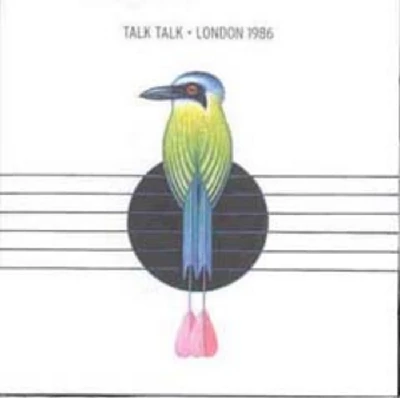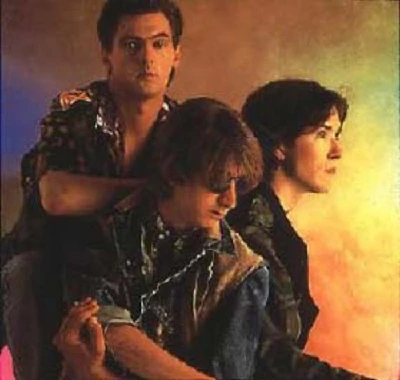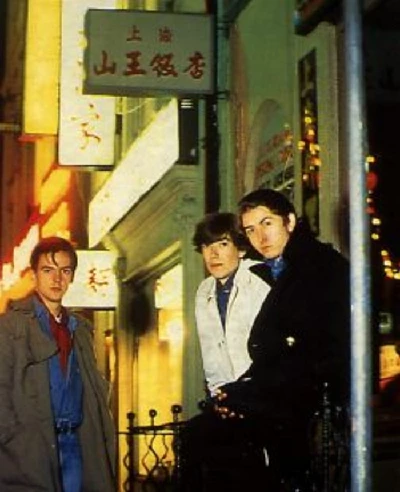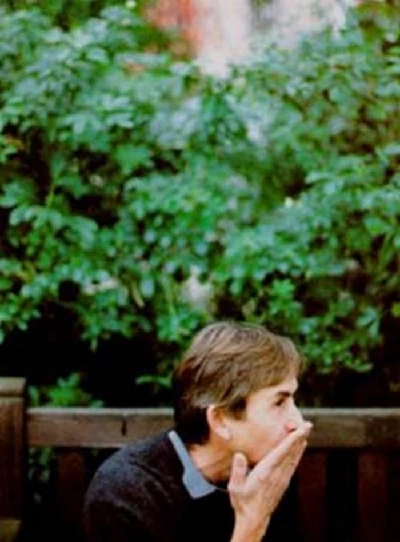published: 23 /
7 /
2005

In the latest in our 'Re : view' series, in which our writers looks back on albums from the past, John Clarkson examines 'London 1986', a live recording released finally in 1999 of Talk Talk's final concert
Article
I first heard this album a whole twelve years before it came out. I would like to pretend that I was the very early recipient of a promo copy or that, an all-knowing 20 year old music kid, I was pressed up against the barriers of the front row of the London Hammersmith Odeon on May 8th 1986, the night that Talk Talk played what would transpire to be their final concert.
The truth, however, is sadly far more mundane. I was approximately 100 miles North that evening in my final term at university in the small Midlands town of Loughborough-working towards my finals and a degree in that most un-rock ‘n’roll of subjects, librarianship- and I heard it on the radio.
I didn’t hear the concert that day. It must have been a week or two later. I remember that it was early on a Saturday night, probably directly after that central focus of entertainment for so many mid 80’s students ‘The A Team’ had finished, and that it was broadcast as an hour long show as part of Radio 1’s ‘In Concert’ series.
I taped it, and kept that tape through temporary unemployment after university, my first job, the next job, buying a house, getting into a long-term relationship, and my initial months of working for Pennyblackmusic after it was formed in 1998. I played it a lot, and when Pond Life, a label set up especially to release Talk Talk rarities, put out ‘London 1986’ in early 1999 I finally upgraded my now fairly worn tape into a CD and kept playing it…
I grew up and matured with Talk Talk. I had first become a fan three and a half years before the Hammersmith Odeon concert while I was still at school, and at the time they made their first initial appearances on ‘Top of the Pops’ in 1982 with the singles ‘Today’ and ‘Talk Talk’.
Talk Talk had formed in London the year before in 1981, and, consisting of vocalist and multi-instrumentalist Mark Hollis, drummer Lee Harris, bassist Paul Webb and keyboard player Simon Brenner, quickly found themselves picked up by EMI and lumped in with the New Romantic movement.
Despite playing an early tour with label mates Duran Duran, one suspected that, even then, as a fledgling group trying to make their mark on the world, it was a role that they were never entirely comfortable with. On those early ‘Top of the Pops’ performances, one of which found them kitted out by EMI with matching short hair cuts and white silken suits, they looked awkward and out-of-sorts. Mark Hollis also seemed slightly less posturing than the average New Romantic front man. For all his then overblown lyrics, typical of the era, about relationship grief and pushy girlfriends, one suspected also as one listened to his vocals that there was also a higher intelligence at work than many of his peers and a want for something better and out-of-the-norm.
Their synthesiser-laden debut ‘The Party’s Over’, which was rush-recorded as a result of record company pressure and released late in 1982, was by no means a bad record, but it was not it. A decent sense of melody and an ear for a catchy tune was marred by its hasty recording schedule and an over reliance on the flashy studio effects of the time.
It was only on their second album, ‘It’s My Life’, which came out in 1984, that Talk Talk and Hollis began to live up to those suspicions and that promise. Brenner had by now left, his place in the band taken by session musicians . The expensive uniform suits were also gone, much to EMI’s annoyance, and had been replaced by donkey jackets and jeans. It was the first Talk Talk album as well to involve musician and producer Tim Friese-Greene, who would become Hollis’ songwriting partner and go on to produce all Talk Talk’s subsequent albums. While essentially still a synthesiser act, Talk Talk had a new found maturity, and, as ‘Rock : The Rough Guide’ has since described it, their sound had “developed from New Romantic to latter-day Roxy Music.”
There were three classic singles, ‘It’s My Life’ (an attack on record label cloning as well as a tale about relationship turmoil), ‘Such A Shame’ (a reflection upon the need to escape and change) and ‘Dum Dum Girl’ (a rant against a former girlfriend who had failed to live up expectations). It was, however, some of the other tracks on the record that seemed to appeal to Talk Talk as much as the singles. A revealing interview with Janice Long on Radio 1 found Hollis far more interested in plugging his own favourite track off the album, ‘Tomorrow’s Started’, a sumptuous piano ballad rather than the ‘It’s My Life’ single. ‘Renee’, another song from the album, proved to be similarly experimental, combining tingling piano chords with spooky atmospherics. ‘Does Caroline Know ?’ was meanwhile an equally eerie jazz number.
Their third album, ‘The Colour of Spring’, which was released in 1986 a few weeks before the last show in Hammersmith, found Talk Talk expanding and diversifying still further. A much more epic album in tone than its two predecessors, ‘The Colour of Spring’ featured an arsenal of special guests, including Pretenders guitarist Robbie McIntosh, Steve Winwood and double bassist Danny Thompson who had worked with John Martyn, Nick Drake and Sandy Denny. Synthesisers had been totally abandoned and most of the tracks, some of which involved brass, had a layered, orchestral feel.
There were another two strong singles in ‘Life is What You Make It’ (a testimony to self-respect) and ‘Give It Up’ (a reflection upon knowing when to walk away). It was again, however, some of the other tracks on the album that proved to be equally memorable. ‘Happiness is Easy’ had Talk Talk experimenting with a children’s choir. ‘Living in Another World’, possibly the most epic of all the tracks on ‘The Colour of Spring’, found a cloth-capped, now shaggy-haired Hollis on the Channel 4 music programme ‘The Tube’ blasting out guttural, piercing riffs on a harmonica as his then seven-piece band swelled up their instruments into a searing, surging melodic frenzy.
‘London 1986’ is a note-perfect copy of the tape that I made all those years ago in Loughborough. There are five songs from ‘It’s My Life’ (‘Tomorrow’s Started’, ‘Does Caroline Know?’, ‘It’s My Life’, ‘Such a Shame’, and ‘Renee’) and three songs from ‘The Colour of Spring’ (‘Life is What You Make It’, ‘Living in Another World’ and ‘Give It Up’). Unusually for a live album, the noise of the audience hasn’t been doctored with at all. The album opens up with ‘Tomorrow’s Started’ and a solitary piano solo from pianist Rupert Black. As the rest of the band kick in, one hears loud cheers and then, in the moment before Hollis starts on his vocals just before the two minute mark, a shrieking yelp from one member of the audience. Elsewhere on ‘Life is What You Make It’ and ‘Such a Shame’ one can hear the audience clapping along in time. When Hollis thanks his fans and wishes them goodnight at the end of ‘Such a Shame’, and he and the band leave the stage, the tape is left rolling before they return to the stage for an encore of ‘Renee’ later. Far from detracting from the set, this, however, only heightens what was obviously a highly impassioned performance still further.
The songs on ‘London 1986’ are similarly augmented from their studio versions. As well as Hollis, Webb, Harris and Black, there were another five musicians-Peter Gabriel guitarist David Rhodes, percussionists Danny Cummins and Phil Reis, keyboardist Ian Curnow and harmonica player Mark Feltham-on stage that evening.
More so than any one of the many Talk Talk compilations that has subsequently been released, most of which have just concentrated on the hits, ‘London 1986’ reveals the twin sides of Talk Talk, their ability and craftsmanship as a singles act, but also their agility as experimentalists. The singles-the rattling rumble of ‘Life is What You Make It’ ; the slow surging, reflective ‘Give It Up’ ; the brazen, bittersweet ‘It’s My Life’ and the atmospheric, effects-laden ‘Such a Shame’-under the auspices of the nine piece band reach new found heights. The album numbers-‘Tomorrow’s Started’, ‘Does Caroline Know ?’and ‘Renee’-are given a further edge. The possible highlight of ‘London 1986’, an extended ‘Living in Another World’, meanwhile becomes even more incendiary and enflamed.
The set was concluded that night with a final encore of ‘The Party is Over’, a track which neither made the radio session or the album. One wonders if that was entirely coincidental or as Talk Talk walked off the stage into the pits that they knew that was the end for them as a live act and that Hollis would never perform again in public
The party, however, was far from over. Talk Talk would stay together for another five years and would record another two studio albums, 1988’s ‘The Spirit of Eden’ and 1991’s ‘Laughing Stock’.
‘The Colour of Spring’ had sold well, and EMI gave Talk Talk a large budget to record a follow-up. The resulting ‘The Spirit of Eden’, which was recorded in a disused Welsh church, ran to six lengthy tracks, each of which segued into the next, and featured the talents of nearly 20 musicians and a choir. Owing a debt as much to Miles Davis than Roxy Music, this mellowest of albums merged Hollis’ sparse, enigmatic lyrics with elements of neo-classicism and and freeform jazz.
It was their masterpiece, universally acclaimed, but, with no obvious single, commercial suicide. The band was dropped by EMI, and their last album ‘Laughing Stock’, another six song LP which found the group both experimenting with feedback and also moving further into modern classicism and freeform, was released on Verve, a specially reactivated jazz subsidiary of the Polydor label.
After Talk Talk broke up, Hollis waited seven years before releasing his next album in 1998, solo record, the entirely acoustic ‘Mark Hollis’, which as Uncut magazine observed at the time was “jazz as might have been performed by 19th century folk musicians”. A musician friend of mine and fellow Talk Talk fan describes those last three albums-‘The Spirit of Eden’, ‘Laughing Stock’ and ‘Mark Hollis’- as “The Holy Trinity.” He is right. There has been nothing like them ever before, and there is unlikely to be ever again.
Hollis is now believed to be retired from music. The rhythm section of Harris and Webb went on to form O.rang, who released two experimental albums, 1994’s ‘Herd of Instinct’, and 1997’s ‘Fields and Waves’, and have also worked together as session musicians with a variety of acts including Midnight Choir.
‘1986 London’ finds Talk Talk on a cusp of a wave, looking back on their illustrious past, and sharpening up and preparing to move on to an even more dynamic future.
For that young man of half a lifetime ago, a few weeks from graduating and listening to that concert alone in his Halls of Residence bedroom, the possibilities, as he heard it for the first time, seemed endless. Nearly twenty years later, as I listen to it yet again , it still does….
Track Listing:-
Picture Gallery:-


